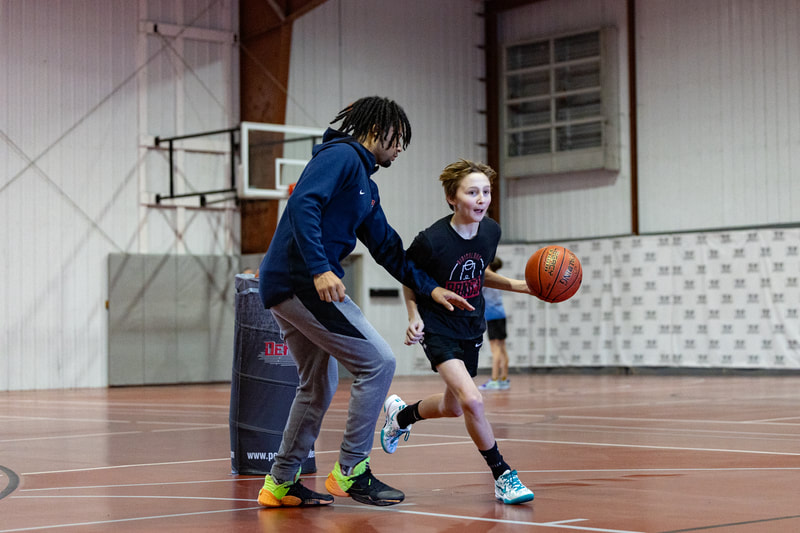|
Coaching a youth basketball team is a rewarding and impactful experience that goes beyond teaching the X's and O's of the game. As a coach, you have the opportunity to instill important life lessons, foster personal growth, and ignite a passion for the sport in your players. Whether you're coaching beginners or seasoned players, here are some key strategies to help you guide your youth basketball team to success both on and off the court.
1. Establish Clear Expectations and Goals Start by establishing clear expectations and goals for the season, both in terms of skill development and team success. Communicate these expectations to your players and their parents, outlining what you hope to achieve together as a team. Setting specific, measurable goals helps keep everyone focused and motivated throughout the season. 2. Focus on Fundamentals Fundamentals are the building blocks of basketball, and they are especially important for youth players who are still developing their skills. Dedicate ample time to teaching and reinforcing fundamental skills such as dribbling, passing, shooting, and defense. Break down each skill into manageable steps and provide plenty of opportunities for players to practice and improve. 3. Create a Positive and Supportive Environment Foster a positive and supportive team culture where every player feels valued, encouraged, and empowered to do their best. Praise effort and improvement, celebrate successes, and provide constructive feedback in a respectful and encouraging manner. Emphasize teamwork, sportsmanship, and respect for coaches, teammates, opponents, and officials. 4. Develop Individual and Team Skills Balance individual skill development with team-oriented drills and strategies. Tailor your coaching approach to meet the needs and abilities of each player, providing personalized instruction and feedback to help them improve. Incorporate a mix of skill-building drills, game-like scenarios, and competitive scrimmages to reinforce concepts and prepare players for game situations. 5. Teach Basketball IQ and Strategy Help players develop their basketball IQ by teaching them the principles of offense, defense, and game strategy. Break down offensive sets, defensive schemes, and transition plays, explaining the reasoning behind each tactic. Encourage players to think critically, anticipate plays, and make smart decisions on the court. 6. Emphasize Effort, Attitude, and Teamwork Encourage players to give their best effort in every practice and game, regardless of the outcome. Emphasize the importance of a positive attitude, resilience, and perseverance in the face of challenges. Highlight the value of teamwork, communication, and supporting each other as teammates. 7. Be a Positive Role Model Lead by example and demonstrate the values and behaviors you want to instill in your players. Model good sportsmanship, integrity, and respect for the game, opponents, officials, and fellow coaches. Show enthusiasm, passion, and dedication to the sport, inspiring your players to do the same. 8. Communicate Effectively with Players and Parents Maintain open and honest communication with your players and their parents throughout the season. Provide regular updates on team progress, upcoming events, and areas for improvement. Be approachable and receptive to feedback, addressing any concerns or questions in a timely and respectful manner. 9. Keep Practices Fun and Engaging Make practices enjoyable and engaging by incorporating a variety of drills, games, and activities that challenge players while keeping them motivated and enthusiastic. Use positive reinforcement, small-sided games, and friendly competitions to keep energy levels high and foster a love for the game. 10. Emphasize Life Lessons and Character Development Above all, use basketball as a platform to teach important life lessons and foster character development in your players. Encourage traits such as resilience, perseverance, teamwork, leadership, and accountability that will serve them well both on and off the court. Help them develop confidence, self-discipline, and a growth mindset that will empower them to succeed in all aspects of life. In conclusion, coaching a youth basketball team is a multifaceted endeavor that requires dedication, patience, and a genuine passion for the game. By establishing clear expectations and goals, focusing on fundamentals, creating a positive and supportive environment, developing individual and team skills, teaching basketball IQ and strategy, emphasizing effort, attitude, and teamwork, being a positive role model, communicating effectively with players and parents, keeping practices fun and engaging, and emphasizing life lessons and character development, you can help your players reach their full potential and experience success both on and off the court. Remember, the impact you have as a coach extends far beyond wins and losses—it shapes the lives of your players and inspires them to become the best versions of themselves. |
Ham Lake, MInnesotaRead
All
|






 RSS Feed
RSS Feed
